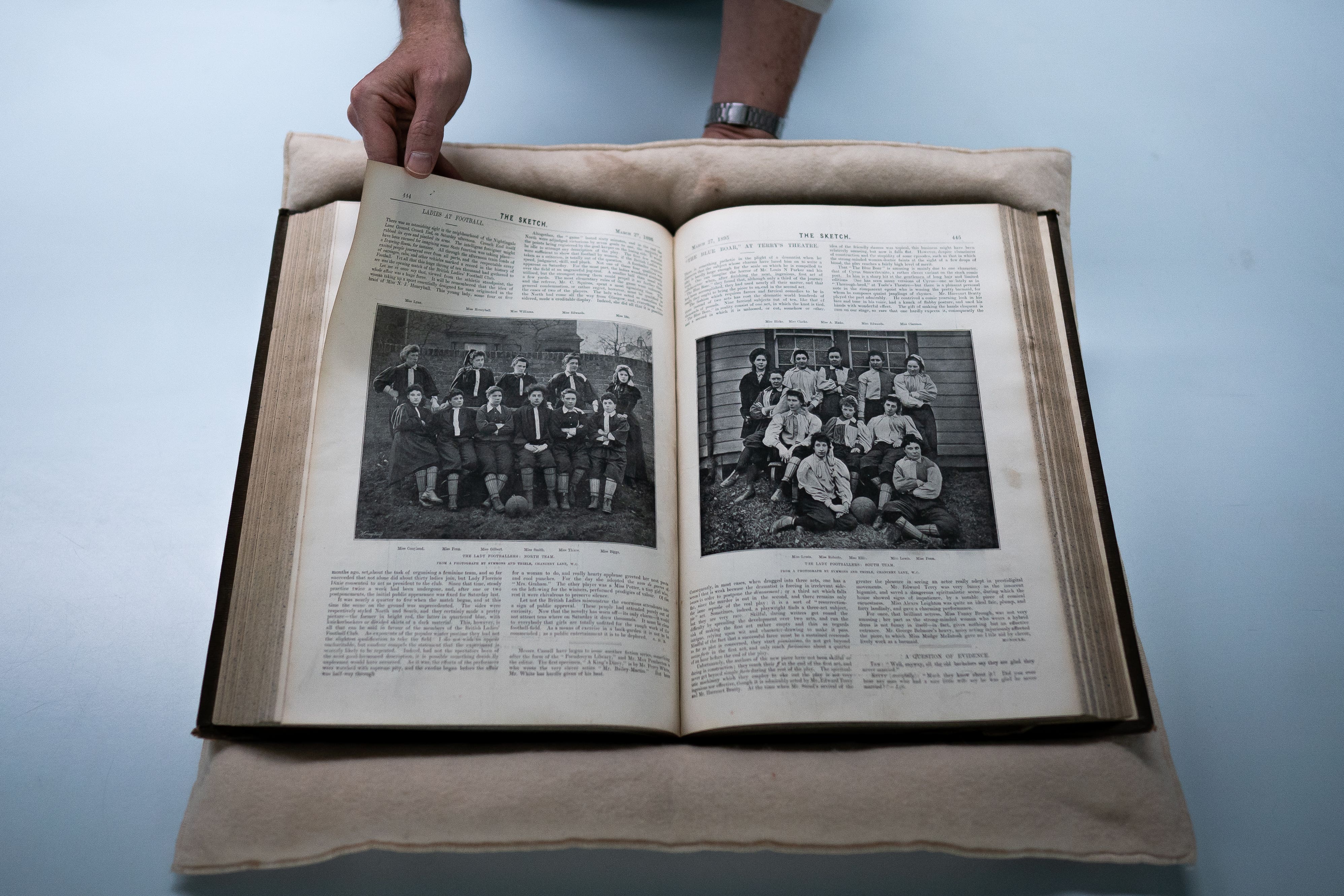Archivists give sports fans rare glimpse into early days of women’s football
The picture, published in The Sketch on March 27 1895, is part of a collection of historical artefacts stored at the London Metropolitan Archives.

Archivists have given sports fans a rare glimpse into the early days of women’s football as England prepare for the 2023 World Cup.
A 128-year-old journal clipping housed at a public research centre shows a picture of teams who played in what is thought to be the first organised women’s football match in London.
The picture, published in The Sketch on March 27 1895, is part of a collection of historical artefacts stored at the London Metropolitan Archives (LMA).
Staff at the LMA, which is run by the City of London Corporation and specialises in the history of London, allowed a PA news agency photographer to capture The Sketch picture, ahead of the 2023 Women’s World Cup, which is being staged in Australia and New Zealand and kicks off on July 20.
They said the match, played in Hornsey, north London, on March 23 1895, featured teams from the newly formed British Ladies’ Football Club
“In 1894, Nettie J Honeyball, of Crouch End, advertised for players to join a new women’s football team,” said an LMA spokesman.
“Although refused permission to train at The Oval by the Football Association, use of a playing field on Nightingale Lane in Hornsey was agreed and practice sessions proceeded with guidance from Tottenham Hotspur centre half John William Julian and tactics sessions from Millwall players.
“The first match, between two teams from clubs ‘North’ and ‘South’, took place at Nightingale Lane on March 23 1895.
“This was the first known organised women’s football match to take place in the capital and a successful advertising campaign drew a crowd of approximately 10,000.
“The ‘North’ team were victorious, winning by seven goals to one.”
He added: “A number of newspapers and journals reported on the game, largely in a critical or satirical tone, but The Sportsman noted ‘I don’t think the lady footballer is to be snuffed out by a number of leading articles written by old men… If the lady footballer dies, she will die hard’.”
Other historical items housed in the LMA collection, which have been photographed by PA, include:
– The Shakespeare Deed
“In 1613, William Shakespeare bought a property in Blackfriars in the City of London,” said the LMA spokesman.
“This might have been an investment property, although it would have been convenient for the Globe and Blackfriars theatres.
“Shakespeare also acquired property in his birthplace, Stratford upon Avon, but this was the only purchase he made in London.
“This deed, which carries one of only six known examples of his signature, records the sale and names his trustees, William Johnson, John Jackson and John Hemmyng.
“Mr Johnson, a citizen and vintner of London, may have been the landlord of the Mermaid tavern in Cheapside. Mr Hemmyng was probably the John Heminges, actor and friend to Shakespeare, who would go on to compile the First Folio of his work with William Condell in 1623.
“The house in Blackfriars was in the precinct formerly occupied by a Dominican house dissolved in 1538. The exact location is uncertain, although it is known to have abutted on the street leading down to Puddle Wharf – now St Andrew’s Hill.”
He added: “To celebrate the 400th anniversary of the publication of the First Folio, London Metropolitan Archives will display The Shakespeare Deed later this year.”
– Magna Carta, 1297
“Magna Carta is probably the most famous document in English history, and this is probably the finest surviving version from the 13th century,” said the LMA spokesman.
“The original agreement between King John and the barons was made at Runnymede in Surrey in June 1215 and the document now known as the Magna Carta sealed.
“The Mayor of London, William Hardel, was appointed with a group of barons from across England to ensure its terms were carried out. London was the only city to be specifically named in the charter – ‘the City of London shall have all its ancient liberties by land as well as by water’.
“In 1297 Edward I wanted to raise funds for wars in Scotland and on the Continent and so agreed to the confirmation of the Magna Carta in Parliament. This gave the charter statutory force and so constitutionally the 1297 document is the most important version.
“The Sheriffs of the City of London were sent a 1297 copy of the Magna Carta with a note or ‘writ’ sewn to the bottom left-hand corner of the document. This writ directs the Sheriffs ‘to cause, without delay, the aforesaid Charter to be published in the aforesaid City, and the same, as far as in you lies, to be strictly observed and kept, in all and every its Articles’.
“The Magna Carta, drawn up at a time of great political crisis to resolve specific problems, now has a national and international significance and has influenced the development of constitutional law throughout the world. Magna Carta has given us the principle that government should be accountable to the governed.”
Bookmark popover
Removed from bookmarks